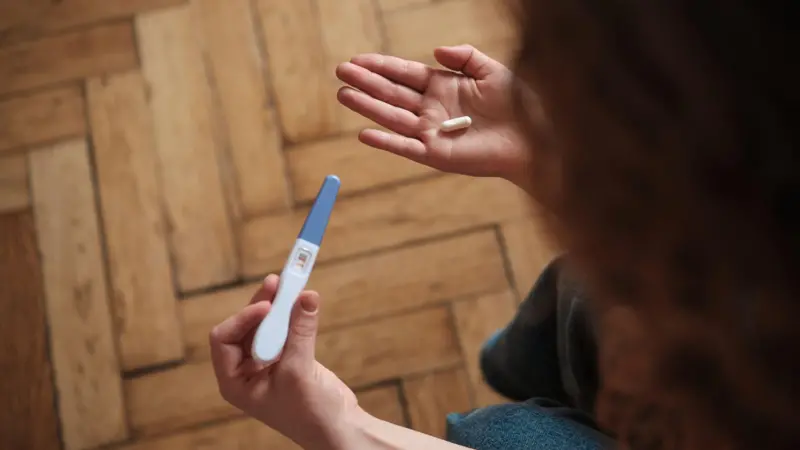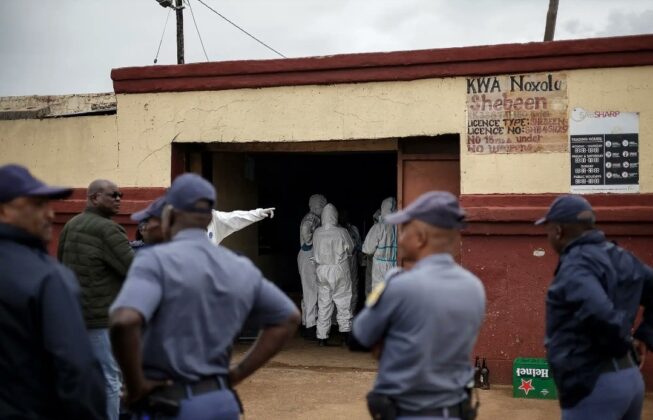
The image of a pregnancy test alongside medication powerfully symbolizes the deeply personal decisions and medical realities at the heart of the UK's abortion decriminalisation debate. Credit: GETTY IMAGES
MPs gather in the House of Commons, a pivotal vote looms that could fundamentally alter the landscape of abortion law in England and Wales, with profound implications for the lives and well-being of countless women. Two landmark amendments, tabled by Labour MPs Tonia Antoniazzi and Stella Creasy, aim to decriminalise abortion, sparking a vital debate that touches on deeply personal decisions and societal compassion.
While both amendments seek to remove the criminal threat to women, they propose different pathways. Commons Speaker Lindsay Hoyle is likely to select one for a decisive vote. Given the deeply personal nature of the subject, MPs are expected to be granted a free vote, allowing them to follow their conscience rather than party lines.
Under current law, abortion in England and Wales remains technically illegal, permitted only under specific conditions up to 24 weeks of pregnancy. Beyond this point, where a foetus is considered ‘viable’ and could potentially survive outside the womb, abortions are restricted to extremely rare circumstances, such as to save a woman’s life or in cases of severe foetal abnormalities. An abortion must also be approved by two doctors, who assess if strict criteria, such as a risk to the woman’s physical or mental health, have been met.
While recent changes have allowed women to access pills to be taken at home to terminate a pregnancy up to ten weeks, this progressive step has, ironically, coincided with an alarming trend. The most recent data reveals 252,122 abortions were reported in England and Wales in 2022 – the highest number since records began. Yet, despite this high demand for care, the shadows of criminalisation linger.
In the last three years alone, six women have faced court proceedings for ending or attempting to end their pregnancy outside the narrow rules of abortion law. These are not just legal battles; they are intensely personal tragedies that lay bare the immense fear and vulnerability women face under the existing legislation. Imagine Nicola Packer, arrested in hospital at the height of the Covid pandemic, facing charges after taking abortion pills, genuinely believing she was only six weeks pregnant, not 26. Or Carla Foster, who was tragically jailed in 2023 for obtaining abortion tablets for a later-term pregnancy, a sentence that sparked such public outrage it was later suspended by the Court of Appeal. These cases, which rightly “provoked outrage and renewed calls to change the law,” underscore the profound distress and unjust scrutiny women can endure.
The reasons a woman might seek an abortion are deeply personal and varied. While the legal framework often cites ‘risk to mental or physical health,’ this encompasses a wide spectrum of lived realities – from a young woman facing an unplanned pregnancy with limited support, to a survivor of domestic abuse, or someone whose existing family responsibilities mean another child would put immense strain on their well-being. For those rare instances where abortions occur later in pregnancy, the reasons are often even more heartbreaking and complex, such as the late discovery of a severe foetal anomaly or a sudden, devastating change in personal circumstances. These are not easy decisions; they are often made under immense pressure and with a heavy heart.
The current debate revolves around two distinct yet converging paths to reform. Tonia Antoniazzi’s amendment aims to lift the looming “threat of investigation, arrest, prosecution, or imprisonment” from any woman who ends her own pregnancy. Driven by the very cases of women like Nicola and Carla, Antoniazzi passionately argues that women in such desperate situations need compassion and support, not criminalization. Her amendment would not alter time limits for abortion or the regulation of services but would specifically decriminalise women accused of ending their own pregnancies, taking them out of the criminal justice system “so they can get the help and support they need.” This approach has garnered significant backing from 176 MPs and leading abortion providers, including MSI Reproductive Choices, British Pregnancy Advisory Service (BPAS), and the Royal College of Obstetricians and Gynaecologists (RCOG) – organisations at the forefront of women’s healthcare, underscoring their belief that this is fundamentally a healthcare issue, not a criminal one. Critics, such as The Society for the Protection of Unborn Children, have labelled it an “extreme and dangerous proposal” that would “effectively decriminalise abortions.”
Stella Creasy’s rival amendment goes further, seeking to enshrine abortion access as a human right and offer broader “protection to all those involved in ensuring that women can access safe and legal abortions.” Creasy argues that Antoniazzi’s amendment would not stop authorities investigating “the partners of people who had an abortion or the medics who provided the abortions and it would not prevent demands for women to give evidence as part of that process.” Her proposal aims to shield not only the woman but also her partners and the healthcare professionals providing care, recognizing the interconnectedness of the support system. While backed by 108 MPs, it has not received support from abortion providers, with Rachael Clarke of BPAS noting that the “incredibly complex” nature of abortion law means Creasy’s proposal may not be the right way to achieve “generational change.” The Society for the Protection of Unborn Children has described Creasy’s amendment as “even more extreme.”
The very existence of laws that criminalize abortion casts a long shadow over women’s reproductive autonomy. It creates an environment where fear can overshadow the critical need for compassionate care, pushing women into isolation or unsafe practices. This fear is amplified for women who are already incredibly vulnerable – survivors of domestic abuse, human trafficking, or sexual exploitation – who need protection and support, not the added trauma of legal battles surrounding their reproductive choices.
It’s important to remember that the core of current abortion law in England and Wales stems from the Offences Against the Person Act of 1861 – a Victorian-era law enacted long before modern medicine or women’s rights were recognised. While the Abortion Act of 1967 introduced crucial legal exceptions, it didn’t remove abortion from the criminal code entirely. This means that, at its core, abortion remains a criminal act in England and Wales, with specific ‘grounds’ under which it is permitted. This historical context highlights the argument that current laws are no longer fit for purpose in a modern society that values bodily autonomy and contemporary medical standards.
Moreover, healthcare professionals also find themselves in an increasingly difficult position. They are bound by a duty of care to their patients, yet the current law can create moral distress and ethical dilemmas, forcing them to consider legal repercussions for providing essential healthcare. Many advocate for decriminalization precisely because they believe abortion is a healthcare issue, not a criminal one.
As MPs prepare for this historic vote, the stakes are incredibly high. This isn’t merely about legal clauses; it’s about shifting from a punitive approach to one rooted in compassion and healthcare. The outcome will determine whether women in England and Wales can seek care without the fear of prosecution, and whether society truly acknowledges the complex, often heartbreaking, realities behind abortion decisions. It’s a vote that will profoundly shape how women’s reproductive lives are viewed and protected in the UK.



